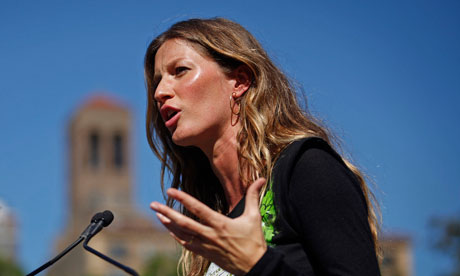
As if things weren't bad enough with lad mags resplendent with images of breasts, marking them out of 10 alongside cars and iPods, it now seems that some media-friendly celebrities have recently caught on to the fact breasts have another raison d'etre: breastfeeding.
Brazilian supermodel Gisele Bündchen recently expressed a belief in an interview with Harper's Bazaar that "there should be a worldwide law that mothers should breastfeed their babies for six months". Following the interview, she has written on her blog that she is "not here to judge", though she seems only to take exception to her rhetorical involvement of the law, rather than the actual sentiment of her words.
Where once breastfeeding was something of a taboo – taste and decency being at stake – breast is now emphatically best. The cases in favour of breastfeeding range from the studiously pragmatic to the downright surreal. Breastfeeding is said to enhance intelligence and allows an increased ability to fend off illness, among a multitude of other advantages.
There runs a vast gamut of studies advising women to breastfeed. The Copenhagen-based Centre for Advanced Food Studies has found breastfed babies develop a more sophisticated palate. A Million Women "nun" study found that when testing women who had breastfed against actual nuns (who had never breastfed, for obvious reasons), those who breastfed were less likely to develop breast cancer. Breast, it would seem, is blessed. But as important as research is, the authenticity of reasons to breastfeed is diluted. And a woman's right to have a choice gets lost along the way.
Reasons not to breastfeed vary from mothers experiencing discomfort and bleeding nipples to simply finding the whole thing a bit icky. Breast milk formula is getting closer and closer to having the same nutritional properties as breast milk, and it could be argued that it is more or less equal. Formula benefits include not subjecting the mother to "latch on" pain and for the child not to suffer through the repercussions of a bad diet.
Breastfed babies are less prone to infection than their bottle-fed counter parts. However, many doctors now argue infants in these very early stages of life are unlikely to develop infections anyway. And surely a relaxed, happy mother bottle feeding is better than a stressed, anxious mother breastfeeding, who is only doing so because she feels she's "supposed to"?
This fascination with breastfeeding is yet further removal of a woman's agency over her own body. Women's bodies, and what they chose to do with them, are laid out for public consumption and comment. What's more, this reinforces the emphasis of women as mothers and caregivers. Just as column inches dedicated to diet plans and weight loss remind us we are only as good as our dress size, the big breast issue underlines the notion we are only as good as our successes as mothers.
Put simply, it is another set of reasons to make women feel bad about themselves. To some, breastfeeding will indeed be the "most natural thing in the world". Assuming if to you it is, you do not need scare tactic headlines or supermodel endorsement to prompt it, just as you don't need someone telling you urinating could prevent kidney rupture in order to make a visit to the toilet.
With an insurmountable myriad of things to worry about as a new mother, whether to breastfeed or not is something you should feel able to decide for yourself. According to the Department of Health, only one in a hundred mothers manage to breastfeed for the recommended first six months. Gisele might think about the other 99 whom she may have made to feel a failure with her throwaway comments.

